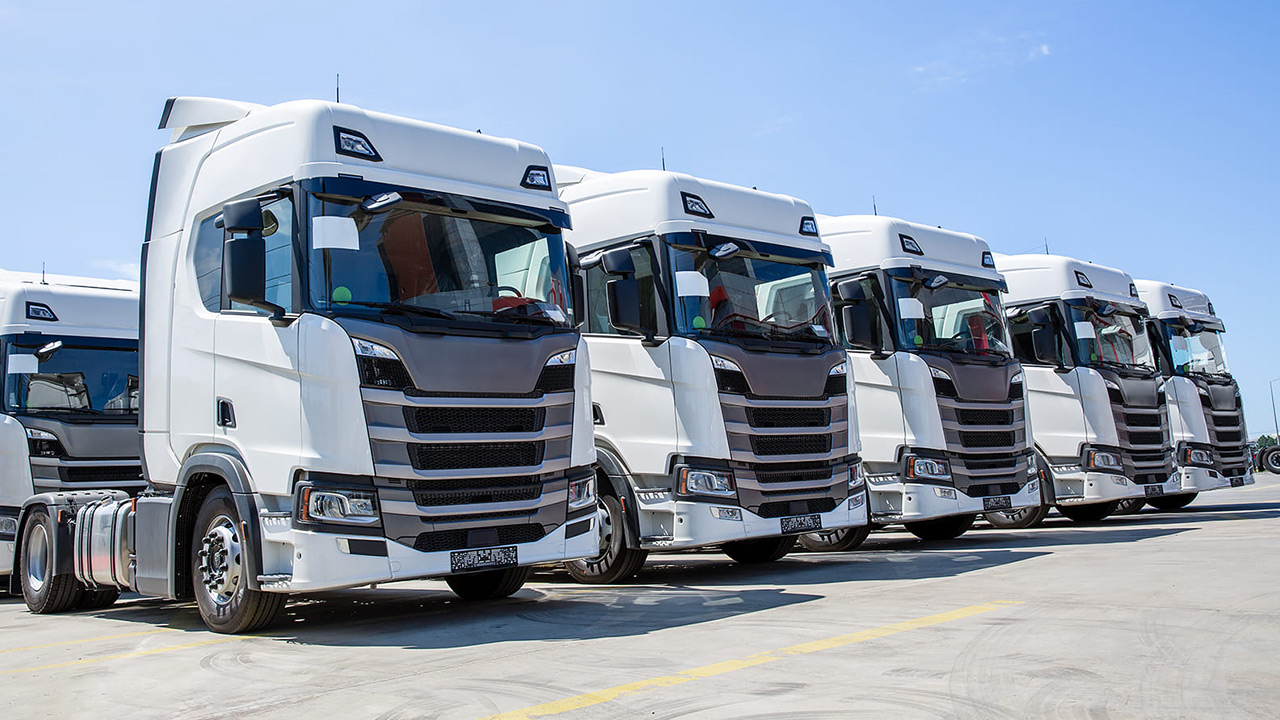Let’s take a look at the most common fleet risks — and how fleet management service providers can help businesses tackle them quickly and effectively. Spoiler: there’s no need for multiple expensive solutions or extra staff.
What is fleet risk management?
Fleet risk management is like playing chess — each move should be carefully considered to anticipate and handle potential threats before they arise.
In simpler terms, fleet risk management is about proactively spotting, evaluating, and dealing with risks that could harm the safety, efficiency, or profitability of fleet operations. A good fleet risk management strategy ensures minor issues, such as a driver’s unsafe driving habits or mechanical faults, don’t snowball into major headaches such as costly accidents or unexpected breakdowns.
At its core, fleet risk management aims to protect drivers, keep vehicles running smoothly, and ensure businesses continue to operate safely and efficiently. To support this, fleet management service providers play a key role by delivering the right technologies that effectively address each major risk.
Top 5 major fleet risks
Fleet owners face a range of challenges, but some fleet management risks are more common — and potentially more costly — than others. Below are five major threats that can affect fleets of all sizes and industries, and where service providers are essential in providing effective solutions.
Vehicle collisions and other accidents on the road. Accidents are one of the most significant risks for any fleet. According to industry data, the annual accident rate for commercial fleets is around 20%. Crashes can cause serious harm to drivers, but the impact doesn’t stop there. They often result in expensive repairs, legal claims, increased insurance premiums, and delivery delays that can damage customer relationships.
Vehicle and cargo theft. Theft remains a widespread problem worldwide. While North and South America report the highest number of cargo theft incidents, other continents are also heavily affected. According to the 2024 Cargo Theft Report by BSI Consulting and TT Club, key hotspots include Brazil, Mexico, India, the United States, Germany, Chile, and South Africa. Brazil alone reported nearly two cargo thefts per hour — more than 17,000 cases in a single year. The impact goes beyond the value of stolen goods, often leading to missed deliveries, unhappy clients, and time lost managing insurance and police reports.
Poor maintenance. Maintenance issues may not always grab attention, but they’re just as risky. When vehicles aren’t properly maintained, the chances of breakdowns — and accidents — increase. A study by the U.S. Federal Motor Carrier Safety Administration (FMCSA) found that about 10% of fleet crashes are caused by vehicle-related problems, often due to issues like worn tires or faulty brakes. Thus, overlooking a vehicle’s condition can lead to unexpected costs, delays, and increased safety risks for drivers and others on the road.
Unsafe driving habits. Driver behavior also plays a critical role in fleet safety. Speeding, texting and eating while driving, or operating a vehicle while fatigued — all raise the risk of accidents. For example, the Virginia Tech Transportation Institute found that texting while driving makes a crash 23 times more likely than driving without distractions. While some of these behaviors might seem minor, they can result in severe injuries or fatalities for drivers and other people on the road, in addition to legal liabilities, vehicle damage, and disruption to business operations.
Regulatory non-compliance. Regulations around safety, driver hours, and emissions are becoming increasingly strict across many regions. Failing to comply can result in fines, vehicle downtime, and legal consequences. Beyond the immediate impact, a history of non-compliance can damage a company’s reputation and lead to lost contracts or missed opportunities.
Businesses may also face additional fleet management risks, such as extreme weather, medical incidents, or industry-specific risks. However, the five risks outlined above are the most widespread — and if left unaddressed, they can lead to financial and operational disruptions.
How to prevent all these risks?
Let’s explore modern technologies that fleet management service providers can use to deliver effective solutions — helping fleet owners prevent common risks before they become costly problems.
Fortunately, managing fleet risk challenges doesn’t always require multiple disconnected tools. In fact, some of today’s software systems are designed to handle several risks at once. We’ll take a closer look at how that works in the next chapter.
Vehicle collisions ➜ Preventive safety measures
One key way to prevent vehicle collisions is to use real-time fleet tracking. It lets fleet managers see exactly where each vehicle is and how fast it's going. If a driver is regularly speeding or braking too hard, it’s easy to catch the pattern early and step in before it turns into an accident. Real-time alerts also make it possible to respond immediately when unsafe driving happens on the road.
Route management adds another layer of safety. By keeping drivers on planned, familiar routes, there are lower chances of them getting lost or running into unexpected road hazards. Add in speed limiters or alert systems, and it becomes much easier to ensure drivers stay within safe speed zones — especially in high-risk areas.
To go even further, AI-powered cameras and video telematics can spot signs of distraction, fatigue, or other risky behaviors. Whether it’s a driver checking their phone or showing signs of drowsiness, the system sends out an instant alert — so action can be taken before things go wrong.
|
➜ Real-world example A fuel supply company in Honduras implemented a fleet risk management solution with AI cameras and in-cabin notification speakers. The system monitors driver behavior and provides instant voice feedback to correct risky actions on the spot. As a result, the company recorded zero incidents after installation — proving how the right tools can make a measurable impact. |
__CTA_BANNER_333__
Vehicle and cargo theft ➜ Remote monitoring and protection
Real-time monitoring also plays a crucial role in preventing vehicle and cargo theft. It lets fleet managers know exactly where their vehicles and cargo are and significantly increases the chances of recovery if a theft occurs. If the GPS tracker includes a remote engine shutdown feature, fleet managers can even stop the vehicle’s movement from a distance during a suspected theft.
Geofencing is another smart way to boost security. By setting virtual boundaries around specific areas — such as a parking lot or warehouse — managers receive instant alerts if a vehicle moves outside its designated zone and can act quickly to prevent unauthorized use.
Finally, video telematics provide valuable visual evidence. With cameras installed both inside and outside the vehicle, the system can not only detect criminal activity and send alerts but also capture and store important footage. If an incident occurs — whether it’s cargo theft, fuel siphoning, part removal, or a break-in — the recorded video will show exactly what happened and who was responsible.
|
➜ Real-world example One of Iraq’s largest oil product distributors implemented a Wialon-powered fleet risk management solution to secure its tanker fleet. As a result, product theft dropped to zero. In the event of a suspected incident, security teams now receive instant alerts and can respond without delay. The system also stores full trip histories, making it easy to retrieve relevant information during investigations. |
Poor maintenance ➜ Automated service tracking
IoT sensors embedded in vehicles keep track of key components like engine health, tire pressure, and battery levels. Fleet risk management platforms turn this data into easy-to-read visuals and send real-time alerts when something’s off or outside normal limits.
Maintenance management tools can automate scheduling and tracking, so fleet owners can set service reminders, keep tabs on repair history, and plan future maintenance without the guesswork.
|
➜ Real-world example A Dutch electric scooter rental company relies on fleet management software to monitor real-time battery levels and scooter locations. With full visibility into battery status 24/7, they can schedule timely maintenance, improve planning, and extend battery life. |
Unsafe driving ➜ Driver monitoring and training
Drivers tend to repeat unsafe driving habits, which means the risk of accidents doesn’t go away on its own. While real-time detection and alerts help managers react quickly, reducing risk over the long term takes more than monitoring.
Driver behavior systems track and log key actions such as speeding, harsh braking, rapid acceleration, sharp turns, and excessive idling. AI-powered dashcams and video telematics provide even more insight by detecting distractions, drowsiness, or phone use behind the wheel. This data helps fleet managers identify high-risk drivers early and take action before those habits lead to accidents.
But real, lasting change comes through driver training. Personalized coaching programs based on driver performance data can help correct unsafe behaviors. Driver scores and gamification make the process more engaging, while regular training sessions keep safety top of mind and aligned with current regulations.
|
➜ Real-world example A leading mining company in Tanzania improved road safety by integrating a driver monitoring system with AI dashcams. The system records unsafe behaviors as incidents, tracks follow-up actions, and helps build a stronger driver safety culture. To encourage good habits, the company now rewards drivers who consistently follow safety guidelines with bonuses. |
Regulatory non-compliance ➜ Automated compliance tools
Regulatory fleet compliance is a key responsibility for managers. It can cover everything from driver hours and rest periods to vehicle safety and digital recordkeeping.
Staying compliant is much easier with the fleet risk solutions. Driver monitoring systems catch risky behavior as it happens, helping fleets stay aligned with safety standards. Fleet risk management platforms pull all data into one place and generate automated reports, making it simple to track working hours, breaks, routes, and vehicle use — so records stay accurate and up to date.
Video telematics is also valuable in this context. Used alongside logging systems, they provide visual evidence of driving activity, helping confirm that logs match what actually happened on the road.
|
➜ Real-world example A major logistics company in Bulgaria streamlined its compliance process by automating digital tachograph data downloads. What used to take 15–20 days now takes just 3–5. Instead of manually locating and saving each file — risking errors and missed downloads — the Wialon-powered system now centralizes data for easy access, ensuring full compliance with EU regulations and faster internal reporting. |
How to manage the risks effectively with Wialon?
You might think that managing all risks requires multiple fleet risk solutions and a team of specialists. But that's not the case. Wialon is an all-in-one solution for fleet digitalization, designed to help fleet owners efficiently manage the most critical risks with ease.
Wialon core functionality includes GPS tracking, geofencing, route planning, and real-time alerts. For more advanced needs, Wialon also offers tools for video telematics, driver behavior monitoring, fleet maintenance management, and other features aimed at minimizing operational risks and ensuring regulatory compliance.
Having all these tools in one flexible system helps service providers build comprehensive fleet risk management solutions for their clients — covering major risks and enhancing efficiency, safety, and overall business resilience.
Wialon, the ultimate solution for fleet digitalization
__CTA_BANNER_222__
What business can achieve with an integrated fleet risk management plan
Effective fleet risk management isn’t just about preventing accidents or reducing repair bills — it’s a powerful driver of revenue growth and long-term business success. With a clear fleet risk management program in place, companies can move from reactive problem-solving to proactive planning — freeing up time, resources, and focus for scaling operations and hitting strategic goals.
Fleet management service providers play a key role in making this shift possible. By developing and implementing fleet risk management solutions tailored to their clients’ needs — and backing them with expert support — they can help businesses address multiple risks through a single, integrated approach.
When done right, fleet risk management unlocks a wide range of benefits, including:
- Improved productivity. By preventing downtime due to accidents or vehicle failures, fleets can maintain higher operational efficiency and keep projects on schedule.
- Reduced insurance premiums. Safer fleets file fewer claims, which over time can qualify businesses for lower insurance rates, resulting in significant cost savings across the board.
- Better driver retention. When a fleet risk manager promotes safe driving practices — supported by clear policies, effective coaching, and modern tools — drivers are more likely to feel valued, protected, and motivated to adopt safer habits. This could all lead to improved job satisfaction and retention.
- Optimized fleet utilization. Keeping fleet owners’ maintenance reports up-to-date means fewer surprises and longer-lasting vehicles. Well-maintained fleets spend less time idle and more time doing what they’re meant to do — driving business forward.
- Stronger reputation and customer trust. Fleet owners’ clients notice when things run smoothly. Maintaining safety standards, reliability, and transparency helps build credibility, strengthen partnerships, and attract new clients.
- Smarter, data-driven decisions. Fleet risk management tools offer a wealth of real-time data. This visibility helps managers identify trends, spot inefficiencies, and make better-informed decisions that drive continuous improvement.
- Strategic growth and scalability. When risk is no longer a daily concern, businesses gain room to grow. With operations running smoothly, leaders can focus on scaling the business, expanding into new markets, or diversifying services — knowing the fleet is under control.
When fleet owners see measurable improvements in their operations thanks to integrated solutions, it’s a win-win. For service providers, this translates into greater opportunities for upselling, higher margins, and stronger customer loyalty. Simply put: when a fleet owner’s business grows, so does the business of the fleet management service provider.
Conclusion
Fleet risks are always present — but with the right approach, they don’t have to hold the business back. While reducing accidents and cutting repair costs are clear wins, the real value of effective fleet risk management goes much further.
It paves the way for smoother operations, stronger financial performance, and a reputation built on safety and reliability. In the long run, fleet risk management isn't just about avoiding problems — it's about unlocking the fleet’s full potential.
Are you a fleet management or telematics service provider?
If you’re building or expanding your business in fleet risk solutions, we’d love to support your journey. Contact us at sales@wialon.com — we’ll help you integrate Wialon into your projects and offer the tools you need to grow.
Own or manage a fleet?
If you’re looking to reduce risk and improve safety across your operations, find a trusted Wialon partner in your region via the partner map. They will assess your business needs and recommend the right solution for your fleet.




.jpg)

